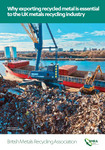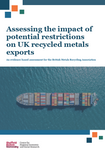Potential steel export restrictions risks collapsing UK metals recycling industry
The industry’s trade association warns that tens of thousands of jobs and billions in economic activity could be endangered
- The UK metals recycling industry currently directly employs over 15,000 people and delivers £9bn GVA per annum.
- The UK steel industry is currently pushing government to impose scrap steel export restrictions as it transitions to electric arc furnaces, citing concerns over ‘scrap availability’.
- An export ban to non-OECD countries would lead to nearly £5bn lost in GVA and costing over 20,000 direct and indirect jobs.
- The British Metals Recycling Association warns that curtailing exports would be short sighted and could see the UK miss out on significant economic growth with global demand for scrap steel set to boom.

Download the BMRA summary of the report

A new report from researchers at Sheffield Hallam University, commissioned by the British Metals Recycling Association (BMRA), has found that restrictions to British scrap steel exports – currently being considered by government – endanger thousands of jobs and hamper the economic output of the metals recycling industry by billions.
The report explores the economic impact on the UK scrap steel sector as the steel industry transitions to low-carbon electric arc furnaces (EAF), which is set to significantly increase domestic demand for British scrap steel. It finds that an export ban to non-OECD countries would lead to nearly £5bn lost in GVA and costing over 20,000 direct and indirect jobs.
Unlike traditional blast furnaces, EAF’s material mix can consist of 100% scrap steel, prompting forecasts of increased demand. To ostensibly ensure supply can meet demand the steel industry has been advocating to restrict British scrap steel exports.
However, today's report quashes any concerns over ‘scrap availability’, demonstrating that even if every single steel furnace open today transitioned to an EAF – as is planned by 2050 – and only used scrap steel as its feedstock, the UK would need just two-thirds of the total annual British scrap steel supply. In other words, over a third of all UK scrap steel would still need to be exported.
James Kelly, CEO of the BMRA, highlighted the broader economic impact of restricting exports: “It wouldn’t just cut tonnage – it would erode the fundamental economics that sustain the sector in a globally competitive environment. Exports are the lifeblood of the UK metals recycling industry and global demand for recycled steel is set to rise dramatically. So, curtailing exports would be short sighted and could see the UK miss out on significant growth for an already large industry that currently directly employs over 15,000 people and delivers £9bn GVA per annum.”
Prof Will Eadson, Professor of Urban and Regional Studies at Sheffield Hallam University, said: “UK steel is a sensitive market, and our research shows how even modest policy changes to protect domestic recycled steel can have substantial and lasting economic effects. Our economic models demonstrate why careful thought must be given to any measures which seek to restrict overseas trade – we can see clearly how quotas and bans may lower exports, but at a cost to the overall value of the sector. Our research also highlights the need for continued and deeper dialogue between government, metal recyclers, and steel producers to develop policy that meets the needs of all parties.
“The steel industry is going through a period of transformation, and it is important to understand how these changes will affect the people, jobs, and prosperity at the heart of our steel communities. Supporting large producers through this transformation will be important to ensuring a prosperous and sustainable future, but we must also recognise the importance of the wider steel supply chain to UK prosperity and security, including the essential role played by the metals recycling sector.”
The report also models what impact export bans would have in various different policy scenarios. For example, an export ban to Türkiye, the UK’s largest recycled metals export destination, would result in over a £2bn loss of GVA and more than 6,800 jobs.
James Kelly continued: “These findings demonstrate that restricting recycled metal exports is not a viable solution. Even if there is significant domestic retention of the economic value created through exports and rerouting to alternative markets following a ban, the metals recycling industry never fully recovers the value it currently generates in a market which is heavily regulated, but crucially open.”
ENDS
Media contact: Sam Freedman | [email protected] | 0757 080 9556
About British Metals Recycling Association
The British Metals Recycling Association (BMRA) represents the £7 billion metals recycling sector, which comprises an estimated 2,000 businesses and employs over 15,000 people. The industry trades and processes 11.5 million tonnes of ferrous and non-ferrous metals every year, including: steel, aluminium, and copper. On average, the UK exports between 70%-80% of all scrap arisings in the UK. The industry contributes £9 billion in gross value added each year.
Scrap metals are secondary raw materials whose use reduces the demand for precious natural resources needed to make new metal compounds – such as iron ore in steelmaking; nickel in stainless steel; or alumina and bauxite in aluminium smelting.
For example, every tonne of recycled steel saves:
- 1.5 tonnes of iron ore
- 1.5 tonnes of carbon dioxide
- 0.5 tonnes of coal
- 70% of the energy
- 40% of the water
The figures for aluminium and copper are even more impressive. The recycling of copper requires up to 85% less energy than primary production. Around the world, this saves 40 million tonnes of CO₂. Recycling aluminium uses 95% less energy than producing aluminium from raw materials and saves 97% of greenhouse gas emissions produced in the primary production process.
About Sheffield Hallam University
Sheffield Hallam University's vision is to become the world's leading applied university, transforming lives and creating opportunities for people from all backgrounds.
With more than 28,000 students, it is one of the UK's largest universities and a leading provider of health education and teacher training. Sheffield Hallam also educates more students from underrepresented backgrounds than any other UK university.
The application of knowledge is at the heart of everything the University does, from students’ learning and experience to business partnerships and innovative research addressing real world challenges.
As a university proudly of its place, Sheffield Hallam is committed to Sheffield and South Yorkshire. In recognition of its leadership both internationally and in promoting the region, the University recently received two awards at the Times Higher Education Awards (2023) – for International Collaboration of the Year and Marketing/Communications Team of the Year.
Sheffield Hallam’s award-winning approach has also seen it awarded Gold in the Teaching Excellence Framework, and named the north’s best apprenticeship provider (2024) and University of the Year (2022) at the Educate North Awards.
